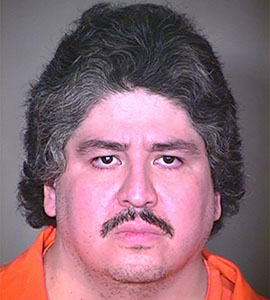- Slug: BC-CNS-Deathrow Reset,670
- Photos available (thumbnails, captions below)
By MADISON ALDER
Cronkite News
WASHINGTON – A federal appeals court ordered a lower court to consider whether an Arizona death row inmate’s trial for the 1990 sex assault and murder of an 8-year-old girl may have been tainted by the actions of a detective.
A three-judge panel of the 9th U.S. Circuit Court of Appeals rejected all of Michael Gallegos’ claims that he was poorly represented by his attorney at his trial and at sentencing in the death of Kendall Wishon.
But the divided panel said a federal district judge should consider whether Gallegos can raise a new argument in state court that Armando Saldate, a Phoenix police detective, failed to advise him of his rights before he confessed to Wishon’s murder.
Gallegos said in court documents that Saldate “had a history of both lying in judicial proceedings and ignoring defendants’ constitutional rights,” facts that prosecutors knew but failed to tell the defense.
Prosecutors did not respond to requests to comment on the decision. But an attorney for Gallegos welcomed the court’s order, which was handed down Thursday.
“We look forward to the opportunity to present to the state court for its consideration,” said Dale Baich, a lawyer in Federal Public Defender’s Office representing Gallegos.
The case began in March 1990 when Gallegos, a Flagstaff native, and George Smallwood went to visit family living in Phoenix – Gallegos’ brother and Smallwood’s mother, who were living together with Smallwood’s younger half-sister, Kendall.
After a night of drinking while working on a car with Gallegos’ brother, Michael Gallegos suggested to Smallwood that they “fondle” Kendall. She was 8, while Gallegos and Smallwood were both high school seniors at the time.
Smallwood agreed and they sneaked into Kendall’s room. But after she began to wake, they covered her mouth and nose and she eventually stopped moving. Thinking she was dead Smallwood suggested they “finish her off,” according to court documents. Though Smallwood was unsuccessful, Gallegos had intercourse with her corpse, the opinion said.
The two carried her body outside and left it under the tree where it was found the next day, no more than 250 feet from the house. Suspicion turned to Gallegos and Smallwood after police realized that there were no signs of forced entry to the house.
After his arrest, Gallegos initially denied the crime but eventually confessed and implicated Smallwood, who denied any involvement.
Both were charged. But charges against Smallwood were dismissed after DNA testing linked Gallegos to the body, but found that Smallwood “could not be included as a contributor to the evidence.”
Gallegos was convicted in May 1991 in Maricopa County with murder and sexual conduct with a minor.
In his latest appeal, he claimed that his trial attorney, Greg Clark, did a poor job representing him, that he treated Gallegos harshly on the stand when he testified in his own defense and that he failed to adequately prepare to challenge the state’s medical expert.
But the court rejected all those claims, noting that Clark had the “exceedingly difficult task” of crafting a defense in the face of “compelling physical evidence” that his client had committed a heinous crime.
Clark told jurors at the outset that though his client was “absolutely responsible” for the crimes, he was still a “scared teenager” who “never intended to kill Kendall,” often referring to Gallegos as a “man-child.”
A second line of defense was the technical argument that Kendal was not alive at the time of the sexual assault and therefore no longer a “person” – a defense that Judge Marsha Berzon wrote in the circuit court opinion was “convoluted, inherently repulsive, and unsympathetic.”
Still, she wrote, that “novel, if disturbing” defense against felony murder may have been Clark’s best option. It was not an argument “certain to lose,” Berzon wrote, upholding the lower court’s decision to reject Gallegos’ claim of ineffective assistance of counsel.
“It would not have been unreasonable for the state court to hold that any deficiencies committed by Clark during the guilt phase did not prejudice Gallegos at the penalty stage,” she wrote.
^__=
Web links:
_ Gallegos v. Ryan: http://cdn.ca9.uscourts.gov/datastore/opinions/2016/04/07/08-99029.pdf
_ Brady appeal: https://www.scribd.com/doc/307482948/Gallegos-Brady-claim
^__=
The 9th U.S. Circuit Court of Appeals rejected Michael Gallegos’ claims that he was poorly represented in his trial for the 1990 murder and sexual assault of an 8-year-old Phoenix girl, but granted him a new hearing on questions about a detective in his case. (Photo by Ken Lund/flickr via CreativeCommons)
Michael Gallegos, on death row for the 1990 murder and sexual assault of an 8-year-old girl in Phoenix, could get a new hearing on claims a detective in his case may have lied. (Photo courtesy Arizona Department of Corrections)

